Leaders in Post-Paris Times – Achieving 100% RE in Costa Rica
Costa Rica devised an ambitious plan to eliminate the country’s greenhouse gas emissions by 2050 and promote the modernization of the country through green growth.

Costa Rica devised an ambitious plan to eliminate the country’s greenhouse gas emissions by 2050 and promote the modernization of the country through green growth.
We proudly joined the PANORAMA – Solutions for a Healthy Planet initiative by UNEP, UNDP, GIZ, IFOAM – Organics International, IUCN and Rare, as new collaborator.
My name is Oona. I am 23, I am French and I study politics. I joined the World Future Council in May 2019 as an intern for the Future Policy Award 2019: Empowering Youth. A few days ago, I participated in the “Fridays For Future” march in Hamburg.
After months of intensive research, following an outreach to 2,000 agroecology experts from across the globe, the World Future Council is proud to officially give recognition 15 Outstanding Practices in Agroecology 2019. This is the climax of an intense multistep process including a nomination stage, evaluation stage and deliberation by a panel of global experts. But how does the process take shape? Here is a quick overview.
Keen followers will know that the World Future Council has already been directing much of its research efforts to agroecology. In 2018, the World Future Council organized its renowned Future Policy Award (FPA) on the topic of “Scaling up Agroecology”. After a lengthy and meticulous evaluation period, the winners of the award were announced at a ceremony at the FAO headquarters in Rome in October 2018 and the “100% organic state” Sikkim in India beat 51 nominated policies from 25 countries to take the Gold Award.
Following the same theme as the Future Policy Award, the recognition Outstanding Practices in Agroecology 2019 is a furthered effort to find and honour practices carried forward by diverse individuals and organisations, which enable and support transitions into agroecology. From a total of 77 nominated practices from 44 countries, received by a call to action to 2,000 agroecology experts, 23 made it through to the penultimate, most intensive stage of evaluation. Here, extensive research was carried out and interviews with practice representatives were led. As per the World Future Council’s methodology, the practices were compared with the 7 Future Justice Principles, plus the 10 Elements of Agroecology developed by the FAO.
On the basis of the World Future Council’s evaluation report on the shortlisted practices, a global panel of experts decided which of the practices provide the best solutions in agroecology, in accordance with the evaluation framework. The Jury for the 2019 Outstanding Practices in Agroecology was made up of internationally renowned experts:
In total, 15 practices were granted recognition and celebrated at the event. With the recognition, the World Future Council seeks to raise global awareness for these exemplary practices and speed up action towards just, sustainable and peaceful societies.
18th January 2019 also marks the release of the Position paper (in German) ‘Agrarökologie stärken: Für eine grundlegende Transformation der Agrar- und Ernährungssysteme’ of which the World Future Council and 56 other German and international organisations are official signatories. This paper marks real movement and co-operation in the field of agroecology and its potential to present a real, sustainable alternative to the current global system. The paper features background information, a call of solidarity to action, the necessary steps to move forward and most importantly issues clear demands to the German government.
The recognition is organised by the World Future Council (WFC), in collaboration with the start-up Technology for Agroecology in the Global South (TAGS).
On Thursday 29th November, Berlin provided a solace of winter sun after a week of heavy-hanging weather to welcome World Future Councillor and world-renowned environmental activist, Prof. Dr. Vandana Shiva, and the Director of the World Future Council, Alexandra Wandel in the capital’s Bundestag Complex. They were invited by Member of Parliament, Renate Künast, former Minister for Food and Agriculture to discuss the agro-political situation in India, the world’s first 100%-organic state and Gold-winner of the Future Policy Award 2018, Sikkim, as well as the road-map to sustainable global agriculture.
“Sikkim shows that we can turn this around and walk the agro-ecological path.”
Vandana Shiva
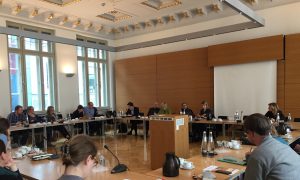 In a simple yet elegant conference room, the Honourable Künast welcomed her guests and 30 audience members from the German Parliament, European environmental institutes and the general public, and opened the discussion. The conversation quickly turned to agriculture in India. As a country whose agricultural face was profoundly transformed under the Green Revolution of the mid-20th Century, India is a notable example of the extreme conflicts and contrasts in the current global food system. Councillor Shiva described the horrors incurred by input-intensive agriculture in the country, which she has repeatedly encountered across four decades of environmental activism. An ongoing suicide-epidemic of hundreds of thousands of debt-ridden farmers, a ‘cancer train’, from the Punjab the Rajasthan, and a youth driven from agriculture and into drug abuse were some of the images she invoked. But the old techniques based on an old reductionist “lego-logic” have been recognised and, by some, reversed in the most radical and inspiring ways.
In a simple yet elegant conference room, the Honourable Künast welcomed her guests and 30 audience members from the German Parliament, European environmental institutes and the general public, and opened the discussion. The conversation quickly turned to agriculture in India. As a country whose agricultural face was profoundly transformed under the Green Revolution of the mid-20th Century, India is a notable example of the extreme conflicts and contrasts in the current global food system. Councillor Shiva described the horrors incurred by input-intensive agriculture in the country, which she has repeatedly encountered across four decades of environmental activism. An ongoing suicide-epidemic of hundreds of thousands of debt-ridden farmers, a ‘cancer train’, from the Punjab the Rajasthan, and a youth driven from agriculture and into drug abuse were some of the images she invoked. But the old techniques based on an old reductionist “lego-logic” have been recognised and, by some, reversed in the most radical and inspiring ways.
“A new knowledge of an old knowledge will be the future of humankind.”
Renate Künast
Over the past 45 years, Sikkim state in the Himalaya Region of India has made the transition to 100%-organic agriculture. Model farms, farmer field schools and a total ban on non-organic food-products have been instrumental in training over 65,000 farmers across 75,000 hectares into sustainable, fully-organic methods. World Future Council Director Wandel described how this unprecedented and entirely-successful transformation has earned the region countless benefits for its farmers and the health and well-being of the local people, as well as a 50% boom in tourism and recognition on the global stage. It is for this tireless work in organic agriculture that Sikkim was awarded the Gold Future Policy Award 2018 at the ceremony in front of 170 heads of state in Rome. Whilst 51 other nominations to the post were extensively researched and other policies from Denmark, Ecuador and Brazil received a Silver recognition, Sikkim’s efforts proved by far by the most exemplary.
“A truly visionary and holistic approach to agriculture.”
Alexandra Wandel
As part of her work with the Parliamentary Group on India, Hon. Künast recently had the opportunity to visit Sikkim experience their ground-breaking (and ground-making) work first-hand. She said she was wholly impressed by how the state uses public money to provide possibilities and livelihood dignity for its citizens in organic agriculture. Their valuing of traditional knowledge fuses with the goodness of the people in an atmosphere of respect for one another and the Earth.
“Sikkim is the light. The struggle must continue.”
Vandana Shiva
After all speakers had passionately shared their experiences and knowledge, the floor was opened up for questions from the audience. The opportunities and risks of digitalisation of agriculture came first, and Councillor Shiva was quick to insist on the stark difference between the right to technology and free internet, versus the forced digitalisation of agriculture. We must remain wary of the dangers of commodification of agricultural data for use by big companies. “Defining the commons in this new context,” said Prof. Dr. Shiva, “is extremely important.”
A second audience member asked how Sikkim was perceived at national level – is this the dawn of an organic India? There certainly exist other positive examples, for example, efforts in the Northern state of Ladakh to become organic. However, at national level, major obstacles remain. Vital here is the ongoing commitment to a sustainable vision by all spheres of society.
“We need a real debate across all of our societies or the future is a dead-end. Only food democracy will feed us in 2050.”
Vandana Shiva
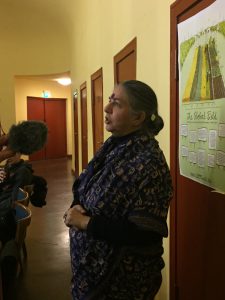 The Director of the World Future Council Alexandra Wandel mentioned that unfortunately not a single German law was nominated for the Future Policy Award on Scaling Up Agroecology and that parliamentarians were invited to have a look at the awarded policies, including the organic policy of Sikkim and also the silver award from neighbouring country Denmark which received the Future Policy Silver Award and has the highest share of organic products in the world.
The Director of the World Future Council Alexandra Wandel mentioned that unfortunately not a single German law was nominated for the Future Policy Award on Scaling Up Agroecology and that parliamentarians were invited to have a look at the awarded policies, including the organic policy of Sikkim and also the silver award from neighbouring country Denmark which received the Future Policy Silver Award and has the highest share of organic products in the world.
The event in the German Parliament came a day after the World Future Council and Councillor Shiva were invited to celebrate Bread for the World’s (Brot für die Welt) 60th anniversary in the German Theatre, and proceeded two exciting events at the historic Babylon Cinema in Berlin’s Mitte district. The first – “Vision for Agriculture 2050” [1] [2] – was a debate between Councillor Shiva, Norbert Lemken, Director Agricultural Policy at Bayer and Prof. Dr. Sonoko Dorothea Bellingrath-Kimura of the Leibniz Centre for Agricultural Landscape Research (ZALF). As the audience outed their respective support and outrage, the debate raged over the science behind chemical inputs, the capacity to feed the world and the morality behind this monumental task. After a short break where audience members could inform themselves with Councillor Shiva’s literature and speak with Liam Innis about the World Future Council and the Future Policy Award, the night continued with the screening of “SEED: The Untold Story” [3]. The film, wherein Councillor Shiva is a protagonist follows the rich and treasured history of Earth’s 12,000 year-old food legacy, which continues to be threatened to extinction by – and fight back against – an all-encompassing agro-industry.
“I think it’s time to bring care, sharing, love, the commons and our brains back into the picture of agriculture.”
Vandana Shiva
[1] https://www.2000m2.eu/de/vandana-shiva-visions-for-agriculture-2050/
[2] https://theworldnews.net/de-news/aktivistin-streitet-mit-konzern-vandana-shiva-vs-bayer-lobbyist
[3] https://www.seedthemovie.com
It’s World Food Day today! Being one of the most celebrated international days, the World Future Council is especially proud that we just distinguished eight truly exemplary policies, the world best agroecology policies, with our Future Policy Award 2018. Among them are policies from Brazil, Denmark, Ecuador, India, the Philippines, Senegal, the United States of America, as well as TEEBAgrifood that accelerate the transformative change in the way we produce and consume our food.
Yesterday evening a high-level Award Ceremony was held in the prestigious Sheikh Zayed Centre of FAO Headquarters in Rome, Italy, in presence of more than 170 Heads of State, Ministers, Permanent Representatives and other eminent guests, including FAO Deputy Director-General Ms Maria-Helena Semedo.
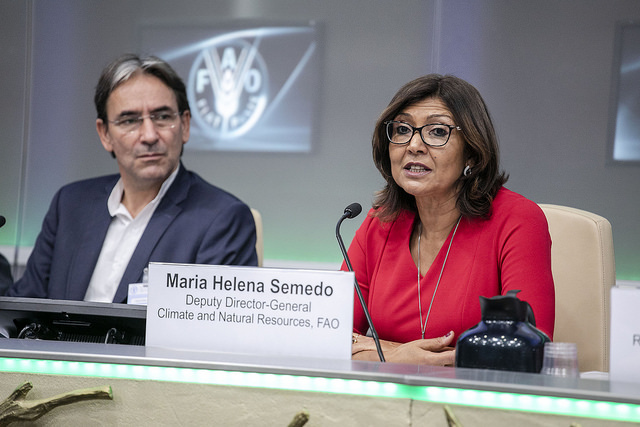
Helmy Abouleish (Sekem Group, Member of the World Future Council, and Maria Helena Semedo, Deputz DG, FAO. ©FAO/Giuseppe Carotenuto
Three World Future Councillors – Prof. Dr Vandana Shiva, Dr. Hans R. Herren and Helmy Abouleish – who are also Right Livelihood Award Laureates were on stage.
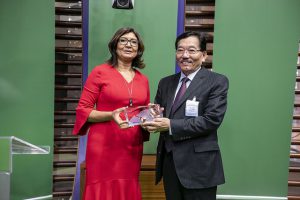
Maria Helena Semedo, FAO Deputy Director General hands over the Future Policy Gold Award to H.E. Dr. Pawan Chamling, Honourable Chief Minister of the Indian State of Sikkim. ©FAO/Giuseppe Carotenuto
Among the representatives of winning policies was H.E. Dr. Pawan Chamling, Honourable Chief Minister of the Indian State of Sikkim, who received the Gold Prize for having realised the first organic state in the world. H.E. Dr. Chamling was accompanied by an entire delegation, including Mr. Somnath Poudyal, Agriculture Minister of Sikkim, and Mr. Mani Kumar Pradhan, Director of Sikkim Organic Mission.
Ms. Vibeke Gram Mortensen representing the current Danish Minister for Environment and Food, Hon. Mette Gjerskov, former Minister for Food, Agriculture and Fisheries, and Mr. Paul Holmbeck from Organic Denmark all came to collect the Silver Award for Denmark’s Organic Action Plan of 2011-2020, which resulted in Denmark having today the highest market share of organic products in the world.
From Brazil, H.E. Alberto Beltrame, Minister of Social Development, joined, along with Ms. Lilian Rahal, National Secretary for Food and Nutrition Security, Mr. Henrique Villa da Costa Ferreira, Executive Secretary for Sustainable Development Goals, Mr. Rogério Augusto Neuwald, Executive Secretary of National Commission of Agroecology and Organic Production (CNAPO), and Ms. Maria Verônica de Santana, Executive Secretary of the Northeastern Rural Worker’s Movement (MMTR-NE). Together, they were handed over the 2nd Silver Prize for the country’s Policy on Agroecology and Organic Production, which in its first cycle of activities led to impressive quantitative results in terms of advancing the agroecological agenda in the country (budget and initiative-wise), investing over EUR 364 million.
The third Silver Award that went to Quito’s Participatory Urban Agriculture Programme AGRUPAR, Ecuador, was personally accepted by Mr. Alfonso Abdo, Executive Director of CONQUITO. AGRUPAR fosters food security, increases incomes, and enhances ecosystem functions, and led to over 3,600 urban gardens growing on 32 hectares and more than 21,000 people trained in ecological production.
This year’s Future Policy Vision Award honoured TEEBAgriFood, a unique comprehensive evaluation framework which allows assessing of impacts and externalities of food systems. The trophy was proudly received by Dr. Steven Stone from UN Environment, Mr. Pavan Sukhdev, Goodwill Ambassador of UN Environment and former World Future Councillor, and Mr. Alexander Müller, TEEBAgriFood Study Leader.
Mr. Rommel C. Arnado, current Mayor of Kauswagan in the Philippines, Mr. Oumar Bâ, current Mayor of Ndiob and President of REVES, Senegal, and Ms. Paula Daniels, Chair of Board and Co-Founder of Center for Good Food Purchasing, and Ms. Alexa Delwiche, Co-Founder and Executive Director of Center for Good Food Purchasing from Los Angeles, USA came personally to receive the Honourable Mentions for Kauswagan’s From Arms to Farms Programme of 2011, Ndiob’s Vision to become a green, resilient municipality of 2014 and Agriculture Development Programme of 2017, and the Good Food Purchasing Policy that was first adopted by Los Angeles in 2012.
Alexandra Wandel, Director of the World Future Council, who acted also as Master of Ceremonies, says: “It was a truly exciting live webcasted event! We profoundly thank everyone. We thank all our partners – foremost FAO, IFOAM, DO-IT, GCI, SEKEM, and ECORNATURASI, all awardees and speakers, as well as jury members, but also the many experts and volunteers, who supported us in making this year’s Future Policy Award possible. It has been a great success!”
After the Award Ceremony all guests were invited to a 100% organic cocktail reception. Partners, awardees and speakers then came together for a Roman agroecological dinner, which rounded off this exceptional occurrence and celebrated the eve of World Food Day with local, healthy, organic and agroecological food.
NOTE: All images shown in this post are the property of UN FAO, ©FAO/Giuseppe Carotenuto. Available via Flickr.
Hamburg/Rome, 12 October 2018 – Future Policy Award winners announced! The world’s best laws and policies promoting agroecology are awarded the Future Policy Award (FPA) 2018. The “100% organic state” Sikkim, in India, is this year’s winner of the “Oscar for best policies”, beating 51 nominated policies from 25 countries. Policies from Brazil, Denmark and Quito (Ecuador) take home Silver Awards. This year’s award is co-organised by the Food and Agriculture Organization of the United Nations (FAO), the World Future Council (WFC) and IFOAM – Organics International.
Gold Prize winner Sikkim is the first organic state in the world. All of its farmland is certified organic. At the same time, Sikkim’s approach reaches beyond organic production and has proven truly transformational for the state and its citizens. Embedded in its design are socioeconomic aspects such as consumption and market expansion, cultural aspects as well as health, education, rural development and sustainable tourism. The policy implemented a phase out of chemical fertilisers and pesticides, and achieved a total ban on sale and use of chemical pesticides in the state. The transition has benefitted more than 66 000 farming families. The Sikkim tourism sector has benefitted greatly from the state’s transition to 100 percent organic: the number of tourists increased by over 50 percent between 2014 and 2017. As such, Sikkim sets an excellent example of how other Indian states and countries worldwide can successfully upscale agroecology.
Three Silver Awards are granted to:
The Vision Award goes to TEEBAgriFood, an initiative of “The Economics of Ecosystems and Biodiversity” (TEEB) by UN Environment. TEEBAgriFood has developed a comprehensive evaluation framework for food systems that helps decision-makers to compare different policies and the market to value food more accurately.
The three Honourable Mentions of the Future Policy Award, this year go to the Good Food Purchasing Policy of Los Angeles, USA (2012), to the Agriculture Development Programme of Ndiob, Senegal (2017) and to the From Arms to Farms Programme of Kauswagan, the Philippines (2011).
Winners of this year’s Future Policy Award will be celebrated in a ceremony on 15 October 2018 at FAO headquarters during the World Food Week in Rome. A life webcast is available at http://www.fao.org/webcast/home/en/item/4874/icode/ and photos at: https://bit.ly/2Et5MI6
The Future Policy Award 2018 is co-organised by the World Future Council, FAO and IFOAM – Organics International, with the support of Green Cross International, DO-IT – Dutch Organic International Trade, Sekem Group, Egypt and EcorNaturaSi, Italy.
“By scaling up agroecology, it is possible to tackle malnutrition, social injustice, climate change, and loss of biodiversity. Through effective, holistic policymaking, we can transform our food systems so that they respect people and planet. The 2018 Future Policy Award winners prove that it is feasible – and how. Policymakers across the globe should follow their example and step up similar exemplary political action!” says Alexandra Wandel, Director of the World Future Council.
Maria-Helena Semedo, FAO Deputy Director-General, states: “A transition to sustainable food and agriculture systems is critical to achieving sustainable development, and the 2018 Future Policy Award is unique as it highlights policies that advance such a transition. FAO is proud to honour, along with the World Future Council and IFOAM – Organics International, such leadership and political will.”
“This year’s Future Policy Award honours exceptional policies adopted by political leaders who have decided to act, no longer accepting widespread hunger, poverty or environmental degradation. They are committed to better food and agriculture systems, and have achieved unimaginable change,” notes Louise Luttikholt, Executive Director of IFOAM – Organics International. “One of them is Sikkim’s Chief Minister Pawan Chamling who set an ambitious vision and achieved it: Sikkim became the first organic state in the world – 100% Organic is no longer a pipe dream but a reality, serving as an outstanding role model for others to follow.”
More Information about the winning policies can be found here: http://www.worldfuturecouncil.org/future-policy-award-2018-agroecology-brochure
Follow the 2018 Future Policy Award on Twitter with #FuturePolicyAward or #FPA2018
The Future Policy Award is the only award which honours policies on an international level. Each year, the World Future Council chooses a topic for the Future Policy Award on which policy progress is particularly urgent. In partnership with FAO and IFOAM – Organics International, the 2018 Future Policy Award will highlight policies that scale up agroecology to contribute to the protection of life and livelihoods of small-scale food producers, ensure sustainable food production systems and implement climate resilient agricultural practices. More information about this year’s Future Policy Award is available at: http://www.worldfuturecouncil.org/2018-agroecology
Miriam Petersen
Media and Communications Manager
World Future Council
Dorotheenstr. 15, 22301 Hamburg, Germany
Email: miriam.petersen@worldfuturecouncil.org
Phone: +49 (0)1781018019
www.worldfuturecouncil.org
The World Future Council (WFC) consists of up to 50 eminent global changemakers from governments, parliaments, civil society, academia, the arts, and business who have already successfully created change. We work to pass on a healthy planet and fair societies to our children and grandchildren. To achieve this, we focus on identifying and spreading effective, future just policy solutions and promote their implementation worldwide. Jakob von Uexkull, the Founder of the Alternative Nobel Prize, launched the World Future Council in 2007. We are an independent, non-profit organization under German law and finance our activities from donations. For information visit www.worldfuturecouncil.org
Every year, the World Future Council honours the best policies that create better living conditions for current and future generations with the Future Policy Award, the “Oscar on best policies”. If that sounds complicated, let us explain to you what it actually means – it’s pretty simple and important: We look at the greatest challenges of humankind and search the world for the best solutions in order to spread them.
A quick Q&A session will help you understand. We also interviewed Poppe Braam, founder of DO-IT (Dutch Organic International Trade) why they support the Future Policy Award this year.
The Future Policy Award is the first award that celebrates policies rather than people on an international level. It raises global awareness for exemplary policies and speeds up policy action. Each year, the Councillors of the World Future Council identifies one topic on which policy progress is particularly urgent.
This year’s Future Policy Award is focusing on policies scaling up agroecology. Policies that contribute to the protection of life and livelihoods of small-scale food producers, ensure sustainable food production systems and implement climate-resilient agricultural practices.
In 2018, the World Future Council partners with the Food and Agriculture Organization of the United Nations (FAO) and IFOAM – Organics International. We received support from Green Cross International, DO-IT – Dutch Organic International Trade and Sekem Group, Egypt.
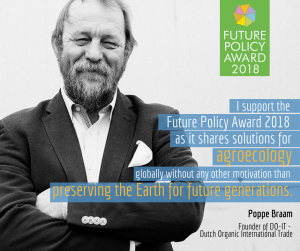
We asked Poppe Braam, who founded DO-IT, an organic food trading company from the Netherlands and he said: “In many countries DO-IT supports farmer transition to certified organic agriculture. Many of them are smallholder farmers, who urgently need more support. This makes local and national policy by governments as well as action by NGOs and agricultural institutes a vital part of this transition. Chemical farming (i.e. today’s conventional agriculture using chemical pesticides and fertilizers) and agroecology are natural opponents. Chemical farming does not only harm nature, but it also harms our health and climate. Moreover, the business of organic farmers is threatened due to levels of pesticide and GMO contamination by wind or water. It is therefore critical to scale up agroecology and policymakers should now step up their efforts.”
Buy organic and agroecological local or regional produce and support thereby family farmers in your region! Just like every raindrop counts towards a river, so does every choice you make in what you consume.
Yes! Now that the Future Policy Award identified and highlighted policy solutions from around world, we need to make them known to policy-makers around the world. We need funding for publishing in-depth policy reports, campaigning events, etc. Every donation will help!
Windhoek, 22 February 2018. In the far north-west of Windhoek, on the boarder of the informal settlements of Goreangab, a visionary new project was born yesterday. Farm Okukuna wants to improve food and nutrition security in the capital’s northern settlements.
At the ground-breaking ceremony, City of Windhoek Councillor Ananias Niizimba pointed out that “Farm Okukuna will be the centre for a number of programmes, including growing food, marketing it, supporting small enterprises and entrepreneurship and – also very important – improving nutrition”. The City of Windhoek has provided the erf, is putting up fencing and will organise basic services such as security, electricity, semi-pure and fresh water.
Travelling through Tigray, northern Ethiopia is a mind blowing experience for anyone with an eye for land management. Hill after hill after hill is terraced. Stones are piled up in long benches to stop water flowing off. All of this back breaking work has been done by local communities over the past 30 years.